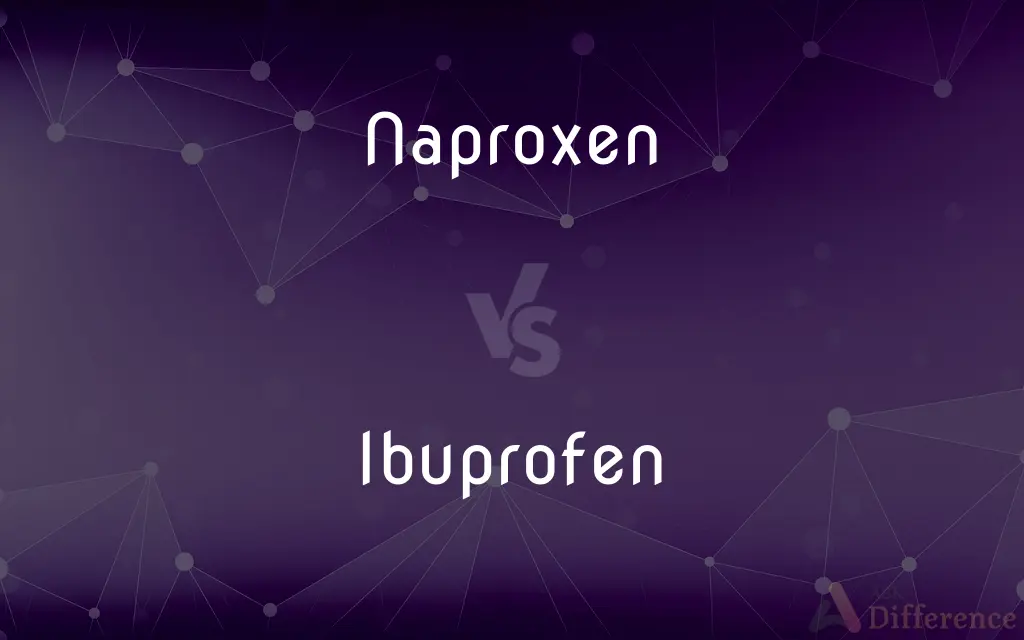Naproxen vs. Ibuprofen — What's the Difference?
By Tayyaba Rehman & Fiza Rafique — Published on March 6, 2024
Naproxen and ibuprofen are both NSAIDs used to reduce inflammation and pain, but naproxen has a longer duration of action, making it potentially better for conditions requiring sustained relief, and ibuprofen is taken more frequently for pain management.

Difference Between Naproxen and Ibuprofen
Table of Contents
ADVERTISEMENT
Key Differences
Naproxen and ibuprofen are nonsteroidal anti-inflammatory drugs (NSAIDs) that help relieve pain, reduce inflammation, and lower fever. While both are effective for conditions like arthritis, menstrual cramps, and headaches, they have different dosing schedules and durations of action.
Naproxen, with its longer half-life, is typically taken less frequently than ibuprofen, often making it a preferred option for chronic conditions requiring sustained pain management. This longer duration can also mean a higher risk for gastrointestinal side effects if used long-term.
Ibuprofen is more commonly used for acute pain relief due to its shorter duration of action. It's often chosen for the management of mild to moderate pain and inflammation and can be taken every 4-6 hours, allowing for more controlled pain management.
Regarding side effects, both medications can increase the risk of gastrointestinal issues, such as ulcers and bleeding, and cardiovascular problems. However, ibuprofen is generally considered to have a lower risk of gastrointestinal side effects compared to naproxen, especially when used at lower doses or for shorter durations.
Choosing between naproxen and ibuprofen often depends on the specific needs of the individual, including the type and duration of pain, other medical conditions, and potential drug interactions. It's important to consult with a healthcare provider to determine the most appropriate option.
ADVERTISEMENT
Comparison Chart
Duration of Action
Longer, usually taken twice a day
Shorter, taken every 4-6 hours
Pain Relief
Sustained pain relief
Immediate, short-term pain relief
Gastrointestinal Risk
Higher risk
Lower risk, especially at low doses or short-term use
Common Uses
Chronic conditions, arthritis
Acute pain, fever, inflammation
Dosage Frequency
Less frequent
More frequent
Compare with Definitions
Naproxen
An NSAID used for pain relief and inflammation reduction.
Naproxen is often prescribed for arthritis pain.
Ibuprofen
A widely used NSAID for reducing pain, fever, and inflammation.
Ibuprofen is commonly taken for headaches.
Naproxen
Can increase the risk of cardiovascular and gastrointestinal issues.
Long-term naproxen use may lead to ulcers.
Ibuprofen
Generally considered safer for short-term use.
Ibuprofen is preferred for treating acute pain like toothaches.
Naproxen
Known for its longer half-life.
A single dose of naproxen can provide pain relief throughout the day.
Ibuprofen
Has a shorter duration of action than naproxen.
Ibuprofen doses are spread throughout the day.
Naproxen
Typically taken less frequently than ibuprofen.
Naproxen is usually taken twice daily.
Ibuprofen
Less likely to cause gastrointestinal side effects at lower doses.
Short-term ibuprofen use is less likely to cause stomach issues.
Naproxen
Effective for chronic conditions requiring sustained relief.
Naproxen is used for managing chronic back pain.
Ibuprofen
Can be taken every 4-6 hours for pain management.
Ibuprofen is used to manage menstrual cramps.
Naproxen
A nonsteroidal anti-inflammatory drug, C14H14O3, used to treat fever and pain.
Ibuprofen
A nonsteroidal anti-inflammatory drug, C13H18O2, commonly used for its analgesic and antipyretic properties.
Naproxen
(pharmacology) A certain non-steroidal anti-inflammatory drug that inhibits the COX-1 and COX-2 enzymes and thereby reduces pain, fever, inflammation, and stiffness.
Ibuprofen
(pharmaceutical drug) A synthetic compound used widely as an analgesic and anti-inflammatory drug.
Naproxen
A nonsteroidal anti-inflammatory drug (trade name Naprosyn) used in the treatment of arthritis and musculoskeletal inflammation and moderate pain
Ibuprofen
A nonsteroidal anti-inflammatory medicine used to relieve the pain of arthritis and as an analgesic and antipyretic; Advil and Motrin and Nuprin are trademarks of brands of ibuprofen tablets.
Ibuprofen
A nonsteroidal anti-inflammatory medicine (trade names Advil and Motrin and Nuprin) used to relieve the pain of arthritis and as an analgesic and antipyretic
Common Curiosities
Are naproxen and ibuprofen safe during pregnancy?
NSAIDs are generally not recommended during pregnancy, especially in the third trimester. Consult a healthcare provider.
What are the risks of long-term use of naproxen or ibuprofen?
Long-term use can increase the risk of gastrointestinal bleeding, kidney damage, and cardiovascular problems.
Can I drink alcohol while taking naproxen or ibuprofen?
Alcohol can increase the risk of gastrointestinal bleeding with NSAIDs, so it's best to avoid it.
Which is better for fever, naproxen or ibuprofen?
Both can reduce fever, but ibuprofen is more commonly used for its quicker onset of action.
Are there people who should avoid taking naproxen or ibuprofen?
Individuals with kidney disease, ulcers, or cardiovascular issues should consult a healthcare provider before use.
How do I choose between naproxen and ibuprofen?
Choice depends on pain severity, duration needed for relief, and individual health conditions. Consultation with a healthcare provider is recommended.
How long does it take for naproxen and ibuprofen to work?
Ibuprofen usually works within 30 minutes, while naproxen may take longer but offers sustained relief.
What should I do if I take too much naproxen or ibuprofen?
Seek immediate medical attention if you suspect an overdose.
Can children take naproxen or ibuprofen?
Ibuprofen is approved for children 6 months and older, but naproxen is typically recommended for children 12 and older. Always consult a pediatrician.
Can I take naproxen and ibuprofen together?
It's generally not recommended to take them together due to increased risk of side effects.
Is it safe to take naproxen or ibuprofen with other medications?
Some medications may interact with NSAIDs, so it's important to consult a healthcare provider.
How should naproxen and ibuprofen be stored?
Store at room temperature, away from moisture and light.
Can naproxen or ibuprofen cause allergic reactions?
Yes, individuals allergic to NSAIDs may experience reactions and should avoid these medications.
Share Your Discovery

Previous Comparison
Metamucil vs. Probiotics
Next Comparison
Alkaline Perm vs. Acid PermAuthor Spotlight
Written by
Tayyaba RehmanTayyaba Rehman is a distinguished writer, currently serving as a primary contributor to askdifference.com. As a researcher in semantics and etymology, Tayyaba's passion for the complexity of languages and their distinctions has found a perfect home on the platform. Tayyaba delves into the intricacies of language, distinguishing between commonly confused words and phrases, thereby providing clarity for readers worldwide.
Co-written by
Fiza RafiqueFiza Rafique is a skilled content writer at AskDifference.com, where she meticulously refines and enhances written pieces. Drawing from her vast editorial expertise, Fiza ensures clarity, accuracy, and precision in every article. Passionate about language, she continually seeks to elevate the quality of content for readers worldwide.
















































